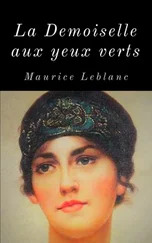Maurice Leblanc - 813 - Maurice Leblanc
Здесь есть возможность читать онлайн «Maurice Leblanc - 813 - Maurice Leblanc» — ознакомительный отрывок электронной книги совершенно бесплатно, а после прочтения отрывка купить полную версию. В некоторых случаях можно слушать аудио, скачать через торрент в формате fb2 и присутствует краткое содержание. Жанр: unrecognised, на английском языке. Описание произведения, (предисловие) а так же отзывы посетителей доступны на портале библиотеки ЛибКат.
- Название:813 - Maurice Leblanc
- Автор:
- Жанр:
- Год:неизвестен
- ISBN:нет данных
- Рейтинг книги:4 / 5. Голосов: 1
-
Избранное:Добавить в избранное
- Отзывы:
-
Ваша оценка:
- 80
- 1
- 2
- 3
- 4
- 5
813 - Maurice Leblanc: краткое содержание, описание и аннотация
Предлагаем к чтению аннотацию, описание, краткое содержание или предисловие (зависит от того, что написал сам автор книги «813 - Maurice Leblanc»). Если вы не нашли необходимую информацию о книге — напишите в комментариях, мы постараемся отыскать её.
813 - Maurice Leblanc — читать онлайн ознакомительный отрывок
Ниже представлен текст книги, разбитый по страницам. Система сохранения места последней прочитанной страницы, позволяет с удобством читать онлайн бесплатно книгу «813 - Maurice Leblanc», без необходимости каждый раз заново искать на чём Вы остановились. Поставьте закладку, и сможете в любой момент перейти на страницу, на которой закончили чтение.
Интервал:
Закладка:
M. Lenormand was on the point of letting off one of those pointed rejoinders in which he was wont to give vent to his chronic ill–temper, when Gourel appeared upon the scene, all out of breath.
"Chief," he panted, "they've found this . . . downstairs . . . in the office . . . on a chair. . . ."
It was a parcel of moderate dimensions, wrapped up in a piece of black serge.
"Did they open it?" asked the chief.
"Yes, but when they saw what the parcel contained, they did it up again exactly as it was . . . fastened very tight, as you can see. . . ."
"Untie it."
Gourel removed the wrapper and disclosed a black diagonal jacket and trousers, which had evidently been packed up in a hurry, as the creases in the cloth showed. In the middle was a towel, covered with blood, which had been dipped in water, in order, no doubt, to destroy the marks of the hands that had been wiped on it. Inside the napkin was a steel dagger, with a handle encrusted with gold. This also was red with blood, the blood of three men stabbed within the space of a few hours by an invisible hand, amid the crowd of three hundred people moving about in the huge hotel.
Edwards, the man–servant, at once identified the dagger as belonging to Mr. Kesselbach. He had seen it on the table on the previous day, before the assault committed by Lupin.
"Mr. Manager," said the chief detective, "the restriction is over. Gourel, go and give orders to leave the doors free."
"So you think that Lupin has succeeded in getting out?" asked M. Formerie.
"No. The perpetrator of the three murders which we have discovered is in one of the rooms of the hotel, or, rather, he is among the visitors in the hall or in the reception–rooms. In my opinion, he was staying in the hotel."
"Impossible! Besides, where would he have changed his clothes? And what clothes would he have on now?"
"I don't know, but I am stating a fact."
"And you are letting him go? Why, he'll just walk out quietly, with his hands in his pockets!"
"The one who walks away like that, without his luggage, and who does not return, will be the criminal. Mr. Manager, please come with me to the office. I should like to make a close inspection of your visitors' book."
In the office, M. Lenormand found a few letters addressed to Mr. Kesselbach. He handed them to the examining–magistrate. There was also a parcel that had just come by the Paris parcel–post. The paper in which it was packed was partly torn; and M. Lenormand saw that it held a small ebony box, engraved with the name of Rudolf Kesselbach. Feeling curious, he opened the parcel. The box contained the fragments of a looking–glass which had evidently been fixed to the inside of the lid. It also contained the card of Arsène Lupin.
But one detail seemed to strike the chief detective. On the outside, at the bottom of the box, was a little blue–edged label, similar to the label which he had picked up in the room on the fourth floor where the cigarette–case was found, and this label bore the same number, 813.

Chapter 3. M. Lenormand Opens His Campaign
"Auguste, show M. Lenormand in."
The messenger went out and, a few seconds later, announced the chief of the detective–service.
There were three men in the prime minister's private room on the Place Beauvau: the famous Valenglay, leader of the radical party for the past thirty years and now president of the council and minister of the interior; the attorney–general, M. Testard; and the prefect of police, Delaume.
The prefect of police and the attorney–general did not rise from the chairs which they had occupied during their long conversation with the prime minister. Valenglay, however, stood up and, pressing the chief detective's hand, said, in the most cordial tones:
"I have no doubt, my dear Lenormand, that you know the reason why I asked you to come."
"The Kesselbach case?"
"Yes."
* * * * *
The Kesselbach case! Not one of us but is able to recall not only the main details of this tragic affair, the tangled skein of which I have set myself to unravel, but even its very smallest incidents, so greatly did the tragedy excite us all during these recent years. Nor is there one of us but remembers the extraordinary stir which it created both in and outside France. And yet there was one thing that upset the public even more than the three murders committed in such mysterious circumstances, more than the detestable atrocity of that butchery, more than anything else; and that was the reappearance—one might almost say the resurrection—of Arsène Lupin.
Arsène Lupin! No one had heard speak of him for over four years, since his incredible, his astounding adventure of the Hollow Needle, since the day when he had slunk away into the darkness before the eyes of
Holmlock Shears and Isidore Beautrelet, carrying on his back the dead body of the woman whom he loved, and followed by his old servant, Victoire.
From that day onward he had been generally believed to be dead. This was the version put about by the police, who, finding no trace of their adversary, were content purely and simply to bury him.
Some, however, believing him to be saved, described him as leading a placid, Philistine existence. According to them, he was living with his wife and children, growing his small potatoes; whereas others maintained that, bent down with the weight of sorrow and weary of the vanities of this world, he had sought the seclusion of a Trappist monastery.
And here he was once more looming large in the public view and resuming his relentless struggle against society! Arsène Lupin was Arsène Lupin again, the fanciful, intangible, disconcerting, audacious, genial Arsène Lupin! But, this time, a cry of horror arose. Arsène Lupin had taken human life! And the fierceness, the cruelty, the ruthless cynicism of the crime were so great that, then and there, the legend of the popular hero, of the chivalrous and occasionally sentimental adventurer, made way for a new conception of an inhuman, bloodthirsty, and ferocious monster. The crowd now loathed and feared its former idol with more intensity than it had once shown in admiring him for his easy grace and his diverting good–humor.
And, forthwith, the indignation of that frightened crowd turned against the police. Formerly, people had laughed. They forgave the beaten commissary of police for the comical fashion in which he allowed himself to be beaten. But the joke had lasted too long; and, in a burst of revolt and fury, they now called the authorities to account for the unspeakable crimes which these were powerless to prevent.
In the press, at public meetings, in the streets and even in the tribune of the Chamber of Deputies there was such an explosion of wrath that the government grew alarmed and strove by every possible means to allay the public excitement.
It so happened that Valenglay, the premier, took a great interest in all these police questions and had often amused himself by going closely into different cases with the chief of the detective–service, whose good qualities and independent character he valued highly. He sent for the prefect and the attorney–general to see him in his room, talked to them and then sent for M. Lenormand.
* * * * *
"Yes, my dear Lenormand, it's about the Kesselbach case. But, before we discuss it, I must call your attention to a point which more particularly affects and, I may say, annoys Monsieur le Préfet de Police. M. Delaume, will you explain to M. Lenormand . . . ?
"Oh, M. Lenormand knows quite well how the matter stands," said the prefect, in a tone which showed but little good–will toward his subordinate. "We have talked it over already and I have told him what I thought of his improper conduct at the Palace Hotel. People are generally indignant."
Читать дальшеИнтервал:
Закладка:
Похожие книги на «813 - Maurice Leblanc»
Представляем Вашему вниманию похожие книги на «813 - Maurice Leblanc» списком для выбора. Мы отобрали схожую по названию и смыслу литературу в надежде предоставить читателям больше вариантов отыскать новые, интересные, ещё непрочитанные произведения.
Обсуждение, отзывы о книге «813 - Maurice Leblanc» и просто собственные мнения читателей. Оставьте ваши комментарии, напишите, что Вы думаете о произведении, его смысле или главных героях. Укажите что конкретно понравилось, а что нет, и почему Вы так считаете.












